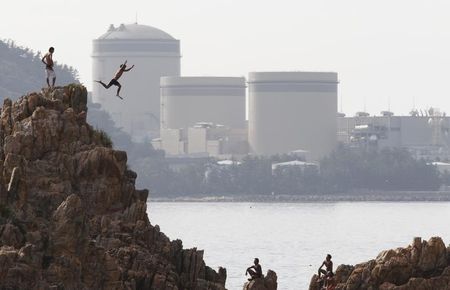By Kentaro Hamada and Osamu Tsukimori
TOKYO (Reuters) - Japan is set to give the go-ahead to restart its idled nuclear industry just as it moves to definitively close some of its oldest reactors, launching a cull of the long-monolithic industry.
As Japan nears the end of its first full year without nuclear power since 1966, regulators are expected to give final safety approval on Wednesday to restart a power station in the south of the country.
At the same time, the government is pressing regulators to make the tough decision on whether to decommission the oldest of the country's 48 reactors, which face higher safety hurdles than the rest. A quarter of those reactors could be targeted for permanent shutdown.
By weeding out reactors that are 40 years old or more, the government appears to be trying to win support for the long process of restarts from a public that turned against nuclear power after the 2011 Fukushima disaster, the worst since Chernobyl in 1986.
"For myself, I would like to proceed with smooth decommissioning (of some plants) and at the same time the restart of nuclear power stations certified as safe," Yuko Obuchi, the new minister for economy, trade and industry, who oversees the nuclear industry, said last week.
The government of Prime Minister Shinzo Abe has been pressing to restart reactors that receive safety approval from the Nuclear Regulation Authority (NRA) to reduce Japan's reliance on expensive imported fuel.
But until recently, the government had not stressed the need for making hard choices about the oldest reactors.
The push for a reckoning on some plants is "clearly part of the strategy by the government and utilities to send a signal to the people of Japan that they are listening and taking into account the lessons of Fukushima", said prominent nuclear-power critic Arnie Gundersen, director of Fairewinds Energy Education.
"But it also reflects the challenge faced by utilities in finding the funds to bring older reactors to a standard that can pass NRA approval," Gunderson, a veteran U.S. nuclear engineer who turned against nuclear energy for safety reasons, said by email.
Under post-Fukushima rules, reactors are supposed to be decommissioned after 40 years. They can receive a 20-year extension but that is subject to more rigorous and costly safety regulations.
As many as two-thirds of Japan's 48 idled nuclear units may never return to operation because of the high costs, local opposition or seismic risks, while one-third will probably come back online eventually, a Reuters analysis showed this year.
The NRA is expected to give final safety clearance at a meeting on Wednesday for Kyushu Electric Power Co's (T:9508) Sendai plant, after granting the two-reactor power station preliminary approval in July.
While the approval certifies the upgraded design and safety features of the reactors, the units, which have been shut for more than three years, will still have to undergo operational safety checks and be given the green light to restart by local authorities.
Local media said the restart of the Sendai plant, located about 1,000 km (600 miles) southwest of Tokyo, may not come until next year.
OLD REACTORS
Utilities that want to extend the operating life of old reactors must submit detailed safety applications by July 2015, explaining how those facilities could be updated to meet the tougher safety standards put in place.
NRA chief Shunichi Tanaka said it takes time and money to clear the additional hurdles. The ageing reactors' capacity is typically about half that of newer ones and it may not make economic sense to make the necessary massive investments.
Kansai Electric Power Co (T:9503) sees scrapping the Mihama No. 1 and No. 2 reactors, both over 40 years old, as an option, a company official said.
Kyushu Electric is considering decommissioning its 38-year-old Genkai No. 1 reactor, a government source told Reuters.
Chugoku Electric Power Co <9504.T> President Tomohide Karita said in March the utility was considering scrapping the 40-year-old Shimane No.1 reactor.

The government is likely to ask the operators of 12 reactors that began operations before 1980 to decide by the end of the year whether to decommission them, media reports said last week.
(Additional reporting by Aaron Sheldrick; Writing by James Topham; Editing by William Mallard and Alan Raybould)
